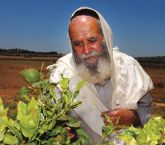×


We have detected your country as:
Please click here to go to the USA website or select another country from the dropdown list.
 Jewish man prays in field
Jewish man prays in field
during Shmitah year – Photo by: Chameleoneye/Shutterstock.com For the last one hundred years, the people of Israel have strived to turn Israel into a veritable Garden of Eden—the Negev and Aravah deserts have blossomed with fruit trees and crops, and millions of trees have been planted on ground once thought to be lifeless and desolate. This year, starting on Rosh HaShanah (Jewish New Year, September 25), this hardworking land will get a vacation!
Most of us are familiar with the Hebrew word for the Sabbath: Shabbat. We may not be as familiar with the word Shmitah (שמיטה). Just as the people enjoyed rest from their labor every seventh day, God instructed them to cultivate their fields for six years and in the seventh year to let the land lie fallow and give it a “Sabbath of solemn rest …a Sabbath to the Lord” (Lev. 25:1–4). This year of rest for the land was called the Shmitah year. Rabbi David Seidenberg called Shmitah “the ultimate Shabbat…One might say that Shabbat is just a practice for Shmitah…”
God promised to bless His children if they kept His command to observe Shabbat and Shmitah. The rain would be abundant in season, the trees would produce fruit, the harvest would be plentiful, and the people would dwell safely in the land (Lev. 26:3–5).
If they did not keep His commandments, the punishment would be horrific: disease, defeat by their enemies, meager crops, wild beasts that devoured their children and livestock, fruitless orchards, and desolate land (Lev. 26:13–41).
In spite of God’s warning, it seems that the children of Israel failed to observe the 7-day and 7-year Sabbaths—the people continued to buy and sell their goods on Shabbat, and cultivated their land on Shmitah. Their disobedience was no small thing in God’s eyes. Scripture connected it to Judah’s destruction by the Babylonians in 586 BC when the people were taken into captivity. What was God’s reason for the exile? So the land could enjoy its Sabbaths as long as it lay desolate while the people were in their enemy’s land (Lev. 26:34–35). For seventy years of exile, the land of Israel could finally enjoy the rest it had been denied for so long.
Through the years that Israel has been observing Shmitah, God’s hand has been seen in a number of miraculous events.
During the previous Shmitah year of 2007, a farmer near Tiberius who owned a banana plantation decided to observe Shmitah. Israel experienced freezing weather for several weeks that December, causing dismay among the banana farmers as they watched the frost destroy their orchards. When this particular farmer went to inspect the damage in his own plantation, he passed neighboring plantations that were completely devastated. From every tree hung brown, hard bananas. But, when he saw his own plantation, he was astounded—the frost had bypassed his property leaving his bananas untouched, the fruit still green and yellow. It was as though a protective blanket had covered his crop right to the very borders of his property. God promised to care for those who kept Shmitah and, with this miracle, He allowed Israel to take note that He still had His eye and His hand on the Land.
 Bare wheat field robbed terrorists of cover – Photo by: Capture Light/Shutterstock.com Avi Jacob told the following story of a miracle that happened this July during the war with Hamas in Gaza.
Bare wheat field robbed terrorists of cover – Photo by: Capture Light/Shutterstock.com Avi Jacob told the following story of a miracle that happened this July during the war with Hamas in Gaza.
The supervisor for the Pesach (Passover) wheat harvest was looking for the best wheat to make matzah for the holiday. He said, “This year we are getting ready for the Shmitah agricultural sabbatical year, so this summer we harvested wheat grain for two years. We searched the whole country, looking for wheat that was sown late in the season and needed rain which fell late. At Kibbutz Sufa, right next to the Gaza border, we found an entire field sown in mid-January, which was considered very unusual, so we found 2,000 acres of green wheat which was just right for us.”
The men began to reap the entire wheat field in July. It was during the air campaign of the first days of Operation Protective Edge, and the harvesters could see the smoke over Gaza and hear the sirens as they worked.
Two days after harvesting was complete, 13 terrorists emerged from a tunnel entrance located in the fields near the kibbutz (communal settlement). They’d hoped to escape detection by hiding in the tall stalks of grain. Unfortunately for them, the entire field had just been cut down, ruining their cover. The bare field allowed the IDF to spot the terrorists and neutralize the attack, saving many lives as a result.
 Iron Dome battery soldier prays in wheat field near Gaza border
Iron Dome battery soldier prays in wheat field near Gaza border
Photo by: Chameleoneye/Shutterstock.com More stories of miracles have come from Shmitah observers. Those who keep Shmitah seem to have God’s hand of blessing upon them. How does someone who doesn’t sow or reap for a full year feed himself, his family, his farmworkers and his animals for what is in fact three years?
The actual miracle is an abundant harvest in the sixth year, so spectacular that its produce will last until the new harvest comes in the ninth year. “And if you say, ‘What shall we eat in the seventh year, since we shall not sow nor gather in our produce?’ Then I will command My blessing on you in the sixth year, and it will bring forth produce enough for three years. And you shall sow in the eighth year, and eat old produce until the ninth year; until its produce comes in, you shall eat of the old harvest” (Lev. 25:20–22).
We serve an awesome God whose loving eyes are on Israel from the beginning of the year to the very end (Deut. 11:12). He opens His hands of provision and continues to show His care for His people and for His Land.
Source: By Kathy DeGagné, BFP Staff Writer
All logos and trademarks in this site are property of their respective owner. All other materials are property of Bridges for Peace. Copyright © 2024.
Website Site Design by J-Town Internet Services Ltd. - Based in Jerusalem and Serving the World.